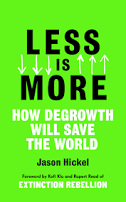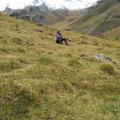Sacronte reviewed Menos es más by Jason Hickel
None
5 stars
Un muy buen libro. Tanto para quienes estén ya interesados en el tema como para quien venga de primeras.
Bien estructurado, te contextualiza tanto las raíces ideológicas y existenciales del capitalismo, como su crecimiento nos lleva al colapso medioambiental y humano, los distintos motivos de esta "necesidad" del crecimiento continuo para las elites financieras y productivas y una serie de soluciones propositivas en torno al decrecimiento y el bienestar humanos. Todo esto plagado de referencias y datos contrastados.
Un muy buen libro. Tanto para quienes estén ya interesados en el tema como para quien venga de primeras.
Bien estructurado, te contextualiza tanto las raíces ideológicas y existenciales del capitalismo, como su crecimiento nos lleva al colapso medioambiental y humano, los distintos motivos de esta "necesidad" del crecimiento continuo para las elites financieras y productivas y una serie de soluciones propositivas en torno al decrecimiento y el bienestar humanos. Todo esto plagado de referencias y datos contrastados.







